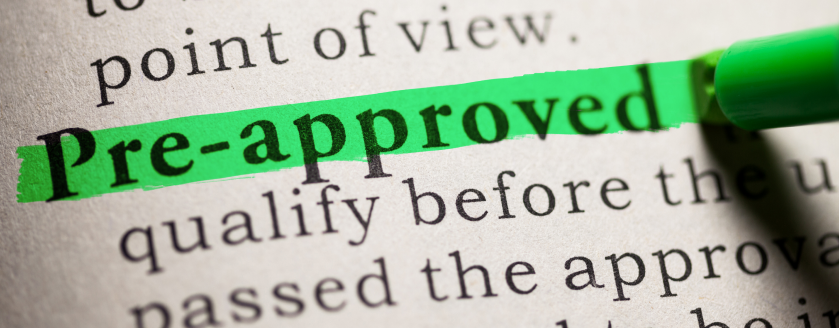Mortgage Preapproval
Written by:
Dan Silva
Dan is the Vice President of Marketplace Lending at Own Up. Throughout his career, he has held executive leadership positions in the mortgage and banking industry.
See full bio

You’ve seen the perfect house on Zillow, or you stopped by an open house and immediately fell in love.
You want that house. You know you can afford that house. But the seller and their agent have no way to know whether you can afford it. And they may not want to waste time dealing with you if they have other qualified, potential buyers are already interested. Even the real estate agent you contact can’t be sure whether you can afford to buy a house at all.
In these days of often-hot and competitive housing markets, you need every advantage you can find when you want to be the successful bidder.
And the best advantage you can secure, as you may know from reading “Buying a House: The Ultimate Checklist,” is a mortgage preapproval.
What Is a Mortgage Preapproval, Anyway?
Putting it in simple terms, a mortgage preapproval is a letter (or email) from a loan officer. It tells home sellers and realtors that after a detailed review of your financial situation and assessment of your creditworthiness, the lender believes that you can afford to buy a house. It also specifies how large a home loan you can realistically expect to receive.
A preapproval letter gives everyone involved in the home buying process a comfort level, letting them know that you’re a qualified and serious buyer and worth their time.
It serves another important purpose, too. When you receive preapproval, a mortgage lender is basically telling you how much of a home you can “afford.” For instance, if you’re preapproved for a $220,000 mortgage loan amount and you have $40,000 in available cash ready to spend, you can comfortably shop for a home in the $250,000 price range – since your total of $260,000 is more than enough for the purchase price and all associated closing costs.
There’s one more benefit. Once you’ve found the home you want to buy and are ready to move forward, the lender who’s given you the preapproval has already done the preliminary work and has most of the documentation he’ll need to process your loan. In short, it saves time.
A mortgage preapproval shouldn’t be confused with the less-authoritative mortgage prequalification, which doesn’t carry as much weight and is often disregarded by brokers and sellers. That’s because the mortgage prequalification process relies primarily on what you tell the lender; they don’t actually verify all of the information you provide. If you fudge the truth you may get a prequalification, but that doesn’t mean you’ll be able to get a mortgage.
It doesn’t hurt to get prequalified, and it’s often viewed as the first step' in the homebuying process because it gives you a ballpark idea of the price range you can consider. When you’re ready to get serious about house hunting, however, you’ll only be taken seriously if you’re a preapproved homebuyer.
Finally, it’s important to understand that a preapproval is not an agreement to lend you money. You’ll still have to go through an even more detailed loan application and mortgage approval process once you’ve actually signed an agreement to buy a home – and the lender can refuse to grant you a mortgage at any time. That’s most likely to happen if mortgage rates go up or your employment and/or credit situations change.
The good news: you’re also not tied to the bank or broker that issued the preapproval. For instance, if you’ve initially dealt with Quicken Loans for convenience sake you’re still able to speak with different lenders like your local bank or credit union, to see if you can find a better deal.
How to Get Preapproved for a Mortgage
To begin the preapproval process, you need to speak with at least one mortgage lender. Ask as many questions as necessary – not only to be sure that you’re comfortable with the lender, but to understand the costs and benefits of the different loan programs that might be available to you.
When you’re ready, the lender will have you complete a formal application, usually over the phone. He’ll also do a credit check and ask for a number of documents in order to establish your identity, assess your creditworthiness, and verify that you have the money or available assets for a down payment and closing costs.
Here’s what you’ll probably have to supply:
- Driver’s license (or American passport)
- Social security number or card (or green card, if you’re not a citizen)
- Verification of income: 30-60 days worth of pay stubs and proof of any extra income, W-2 forms and tax returns from the previous two years (plus corporate tax returns and bank statements if you own a business)
- Verification of assets: several months’ worth of bank and investment account statements (such as 401K or brokerage account statements), plus a “gift letter” if someone is giving you the money for the down payment and doesn’t expect to be paid back
The lender will also call your employer to verify your current status, and obtain your credit score and credit reports. If there are any danger signs in your reports or documentation, he may ask for letters of clarification or additional documents.
It normally takes less than a day to receive a preapproval letter once your application and all of your paperwork has been submitted, although it can take longer if there are red flags in your credit history. A low credit score, delinquent accounts, late payments or high amounts of debt, for example, can lead lenders to take a longer, more critical look at your ability to pay for a house. In that case, preapproval can take days or even weeks.
Qualified applicants, however, can get their “golden ticket” and begin shopping quickly – and they should, since a preapproval is only good for 60 to 90 days. If your search takes longer than that, you may have to go through the process all over again.
The preapproval letter spells out the types of the loans you’ve qualified for (conventional loans, FHA loans, etc.) and the maximum amount of the loan. It usually also details the maximum home purchase price, required down payment and interest rate you’ll be likely to be pay.
Once You’ve Been Preapproved
Always remember that a preapproval doesn’t guarantee that you’ll receive a mortgage. It’s crucial to maintain your employment status and good credit throughout the home search process. In other words, don’t quit or change jobs, keep making on-time monthly payments on all credit cards and student loans, and don’t make any large purchases or open new credit accounts.
The same advice holds true after a seller has accepted your offer to purchase their home, and you’ve begun the final mortgage process. That’s when your actual mortgage application and all of your documentation goes to loan underwriters for an even closer inspection.
They’ll look at specifics like your debt-to-income ratio (how much you owe vs. how much you make), any gaps in employment or historical changes in income – in effect, anything that raises concerns about your ability to make a monthly mortgage payment. If they have more questions, you may have to submit even more documents.
But finally, you’ll get your mortgage approval, along with the final word on how much of a down payment will be required and whether you’ll have to pay private mortgage insurance each month. All that’s left is the closing – and figuring out where to hang that ugly painting your parents gave you as a housewarming gift.


